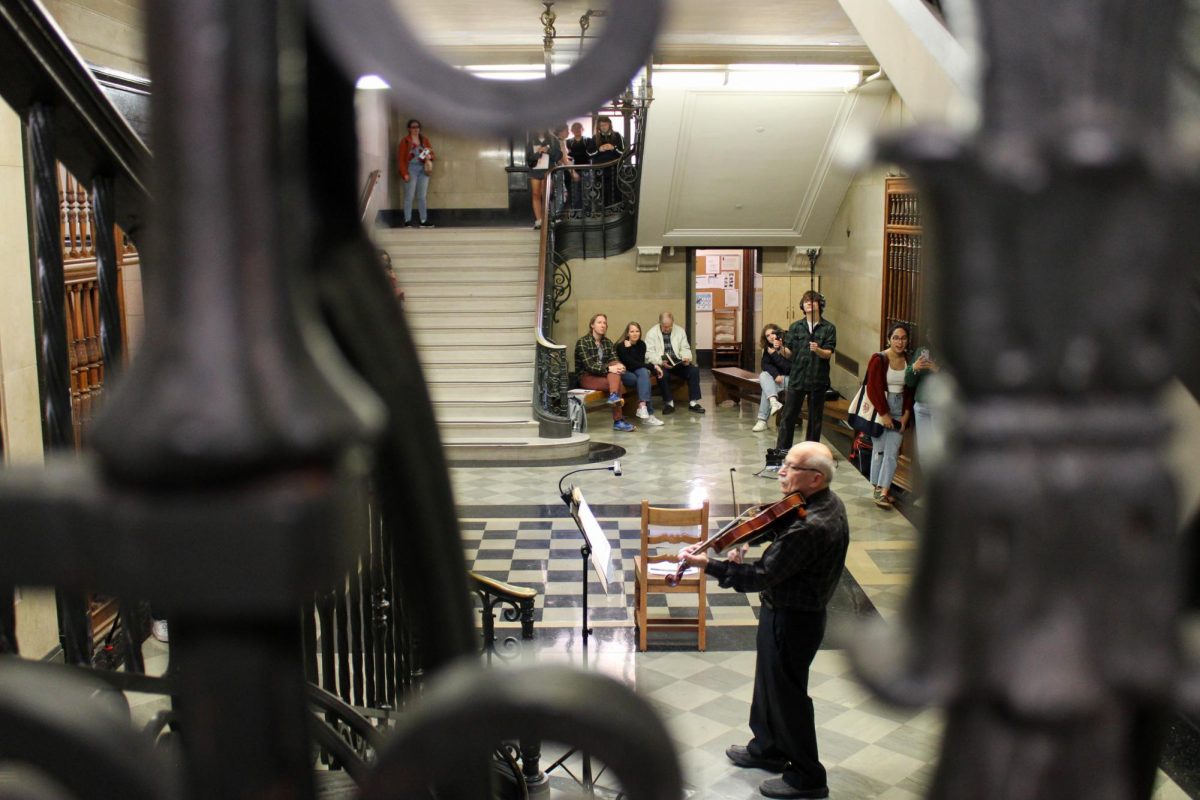The entrancing music of J.S. Bach floated up the stairwell of UT’s Main Building on Tuesday afternoon as a psychology professor played his Tetris viola, participating in an international celebration honoring the classical musician’s birthday. Various spectators and students paused to listen to a free, public performance titled “Bach in the Subways.”
UT Professor Michael Domjan didn’t think his love for classical music and career in psychology mixed, but after thirty years, he learned the duality of the disciplines complemented instead of opposed one another.
“You’re coming and going,” Domjan said to the small and constantly shifting audience. “Stay as long as you want or not at all.”
Domjan’s appreciation for music began with violin lessons from his grandfather in Budapest, Hungary, before his family fled the country in the wake of revolution. Several years later in New York City, Domjan “stumbled” into Juilliard’s preparatory school.
At Juilliard, Domjan discovered the music of J.S. Bach and developed proficiency in the viola. However, due to concerns about making a living as a musician, Domjan said his parents pushed him to pursue academia instead of the arts, so he dove into psychology and received a doctorate with a focus on learning and conditioning.
“I got into my academic work and totally quit playing the viola for about thirty years,” Domjan said. “The rest is history.”
Since Domjan came to UT in 1973, he published numerous academic papers, a world-renowned textbook and ran successful research programs. Additionally, he served as the president of the American Psychological Association and chairman of the Psychology Department for six years.
After a long hiatus of notable advancements within the field of psychology, Domjan discovered “Bach in the Subways,” which originates from classical music performances in the New York City subways.
“The notion of giving music away and particularly bringing it to the attention of people who don’t otherwise hear (it), I really liked that idea,” Domjan said.
Levi Peña, a music freshman who stopped to listen to Domjan play, said that Domjan’s musical abilities impressed him.
“My first thought was that it was unexpected,” said Peña. “(But) I loved it.”
Coupling his passions, Domjan began the Tertis Pavlov Project, which explores the connection between music and psychological processes. He also began teaching a class on the same subject for the interdisciplinary Freshman Signature Course Program.
“I’m a behavioral psychologist and a musician,” Domjan said. “How much more interdisciplinary can that be?”
Disha Ashok Girish, psychology senior and student of Domjan, said she loves having him as a professor due to his unique approach to teaching.
“He’s such a fun professor (in) the way that he teaches,” said Ashok Girish. “(He uses) a lot of examples and metaphors. He (also) brings us Girl Scout cookies.”
When he’s not teaching, writing papers or conducting research, Domjan regularly performs publicly as a reflection of the joy he finds enriching people’s lives through his music. He said he loves to give others something to appreciate amidst the ordinary.
“Some will be captivated by it and others won’t,” Domjan said. “I’m not trying to transform anybody’s life. I’m just trying to give them a more memorable, pleasant experience as they trudge through their daily routine.”














